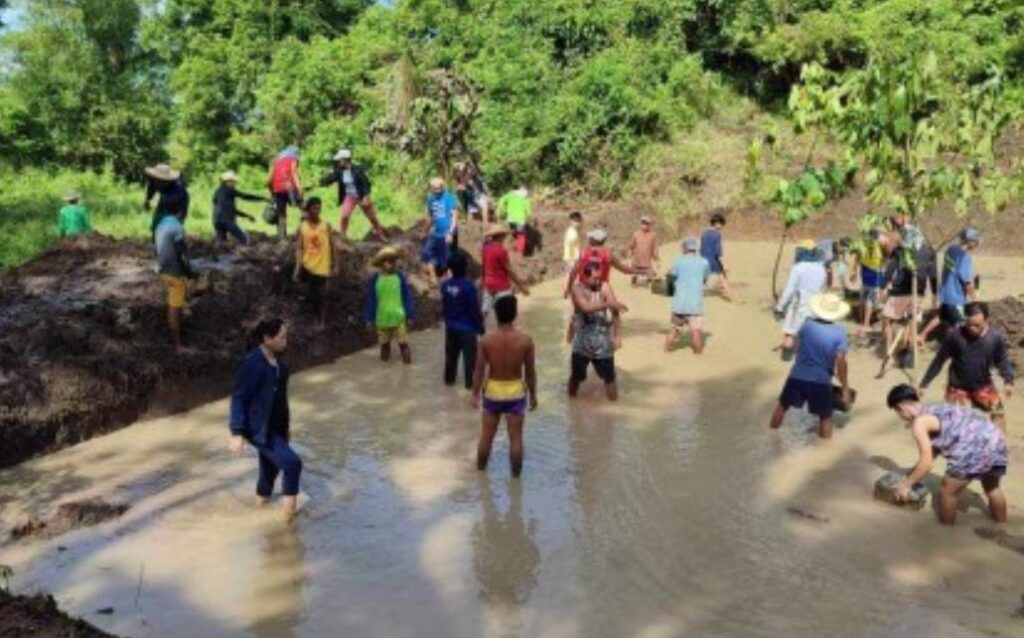Residents of Sebaste, Barbaza and Sibalom towns in Antique province will not worry about food and water shortage during the El Niño season.
They have constructed small farm reservoirs that will ensure irrigation water for farms and serve as fish ponds.
Their efforts were even rewarded under the Department of Social Welfare and Development’s Project LAWA or Local Adaptation to Water Access. The agency provided the SFR builders with financial support through the cash-for-work and cash-for-training components of Project LAWA.
“The Project LAWA aims to assist and protect poor and vulnerable communities from the impacts of the slow onset of the El Niño phenomenon by giving them sustainable water sources and additional income support,” DSWD Secretary Rex Gatchalian said.
Gatchalian said the CFW/CFT beneficiaries in LAWA’s three pilot municipalities in Antique surpassed the 30 SFRs target by building 31 reservoirs in different barangays.
The SFRs are strategically placed in selected towns and constructed within a 20 by 25-square-meter area with a maximum depth of 50 feet.
Launched last 31 August, LAWA is an initiative of the DSWD through the Disaster Response Management Bureau that aims to provide a sustainable solution and proactive intervention in addressing the challenges faced by poor communities during periods of severe drought, ultimately mitigating the threat of water scarcity.
Aside from Antique, the initial phase of the project’s implementation was also carried out in the towns of Aguinaldo, Alfonso and Hungduan in Ifugao province; and in Laak, Monkayo, and Compostela in Davao de Oro province. The strategic locations were specifically targeted based on the severity of the expected impact of El Niño in these areas.
Sustainable solutions
Special Assistant to the Secretary for Special Projects Maria Isabel Lanada said the DSWD has earmarked more than P1.4-billion budget for 2024 that will fund projects geared towards easing the effects of the El Niño phenomenon.
The allocated budget, Lanada said, will be used to fund LAWA and Project BINHI or Breaking Insufficiency through Nutritious Harvest for the Impoverished.
Projects LAWA and BINHI are proactive interventions and sustainable solutions to combat hunger, alleviate poverty, and decrease economic vulnerability of the communities by addressing food insecurity and water scarcity that are exacerbated by climate change and disasters.
For 2024, Projects LAWA and BINHI will be implemented in 294 cities/municipalities in 58 provinces in 16 regions.
“For project LAWA we already had pilot implementation last year. This was done in Davao de Oro for Mindanao, Ifugao for Luzon, and Antique for Visayas. This is an appropriate technology to have water availability in communities,” Lanada said.
Lanada pointed out that during the pilot testing, it was noted that people do not only need water but also nutritious food to ensure their survival and productivity.
“During the pilot testing, we noted that people do not only need water but also food. With the mandate of DSWD being on poverty alleviation and hunger mitigation, we also focused on food security. This is how the Project BINHI came about,” she said.
Both projects, according to Lanada, will provide Learning and Development Sessions on Climate Change Adaptation and Mitigation and Disaster Risk Reduction, and CFW and CFT to beneficiaries in priority areas exposed to the El Niño.
The projects are science and data-driven and are based on the Climate Outlook of the Department of Science and Technology-Philippine Atmospheric, Geophysical and Astronomical Services Administration with the most number of poor families based on Listahanan 3, Lanada explained.
“The target beneficiaries include families of farmers, fisherfolk, indigenous peoples, and other climate and disaster-vulnerable families,” she added.
Each beneficiary will be given the opportunity to participate in CFTW activities for 10 to 25 days with the corresponding daily wage based on the prevailing Regional Daily Minimum Wage Rate range of the project area.
For 2024, Projects LAWA and BINHI will be implemented in 294 cities/municipalities in 58 provinces in 16 regions. Ten SFRs will be constructed in every participating city/municipality with a total of 2,940.
